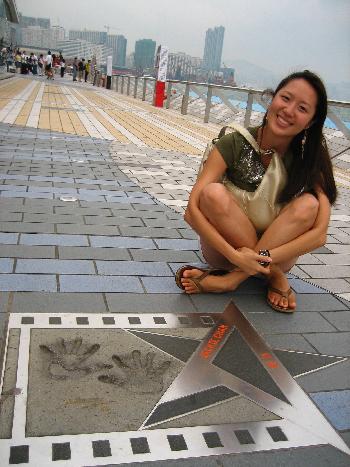Hong Kong.
I immediately knew what to expect as I leaned out on the rail during
the hazy
morning our ship pulled into Ocean Terminal
Harbor City. The mass of sleek
shiny buildings and the towering skylines told me that I’ve been in
numerous
cities such as this. Maybe it was an arrogant presumption but it was
one that I
carried with me the whole five days.
On the
first day of exploring Hong Kong
Island, the sights of
Starbucks Coffee and Seven
Eleven no longer emitted an appreciative thought of home as they had in
Shanghai
two months ago
during my first study abroad experience. The sight of the distinct
logos were
much too familiar, a clear indication of the globalization of
corporations that
I’ve been learning about my junior year at UCLA. I was witnessing it
firsthand
everywhere I went. The people that I passed by on the streets were
unfamiliar
but the place they were living in was all too much so. The images of
LA, Seoul, Shanghai,
and Kobe resounded a little too loudly
in the busy streets of Hong Kong. The
women in heels clicking into a café for
their afternoon coffee, men in dark business suits marching alongside
the
double decker buses that displayed oversized images of European women
in
fashionable dresses. As Alan Smart says in “Participating
in the Global: Transnational Social Networks and Urban Anthropology,” “many ordinary people construct
their lives
and livelihood relationships that cross borders” (62). Globalization
was
saturated in the lives of these people. What did Hong Kong not
have that I could take back and remember as truly “Hong Kong”?
I felt
sweaty and dirty walking the streets of Kowloon.
But it was my mission for the evening to discover Hong
Kong. As I slowly paced myself glancing left and right,
trying to
take in as much as possible, I noticed the quicker steps of the people
around
me. Almost everybody was a step ahead of me and those who were behind
speedily
caught up and passed by with a swish. As I wondered what the rush was,
I
remembered that is also how I walk in LA and in Seoul. I felt as if I was in slow
motion
while the world passed by. Then I noticed an older gentleman being
passed by
the pedestrians just like I was. In a wrinkled suit after a long day,
he had
earphones in his ears and he stared ahead shuffling slowly, taking his
time,
completely unaware of those who were rushing by. For five minutes or
so, that
gentleman and I walked down Nathan Street almost side by side
as everyone around us
beat us to unknown finish lines. Then we parted ways as he stopped at a
light
to cross the street.
slowly, taking his
time,
completely unaware of those who were rushing by. For five minutes or
so, that
gentleman and I walked down Nathan Street almost side by side
as everyone around us
beat us to unknown finish lines. Then we parted ways as he stopped at a
light
to cross the street.
I couldn’t
help but wonder what that man was thinking about, walking the streets,
lost in
his headphones. Was he thinking about his long, weary day and all the
things
that had gone wrong? Or was he thinking about his family he was going
home to?
Or was he lost in the music in his ears? What about everybody else? In
this
glamorous global city with McDonalds, Channel, and Citibank on every
block,
with what thoughts did these people walk and down the streets?
Globalization—no,
Westernization.
This was definitely Westernization. As the world comes together in
closer
proximity, is every street corner in the world doomed to sprout
billboards
displaying Gucci and KFC? These thoughts were what I discovered in Hong
Kong
more than the unique qualities of Hong Kong
itself.

slowly, taking his
time,
completely unaware of those who were rushing by. For five minutes or
so, that
gentleman and I walked down